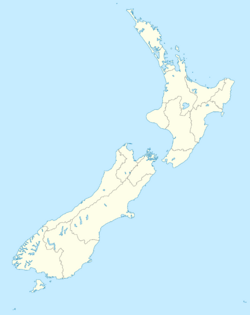Place:Longbush, Wellington
Longbush | |
|---|---|
| Coordinates: [ ⚑ ] : 41°10′5.81″S 175°31′56.52″E / 41.1682806°S 175.5323667°E | |
| Country | |
| Region | Wellington |
| Territorial authority | Carterton District |
| Elevation | 118.9 m (390.1 ft) |
| Time zone | UTC+12 (NZST) |
| • Summer (DST) | UTC+13 (NZDT) |
| Postcode(s) | 5884 |
| Area code(s) | 06 |
Longbush is a rural community in the Carterton District, Wairarapa (within the Wellington Region) of New Zealand's North Island. It is located in a valley southeast of the town of Carterton, and nearby settlements include Gladstone and Ponatahi to the north.
Longbush was established as a settlement in 1902, under the Land For Settlements Consolidation Act 1900, at the same time as nearby Table-lands. Together Longbush and Table-lands had a combined land area of 27,000 acres.[1] In 1904, an application for a school was approved by the Education Board, it opened in 1905.[2] The school closed in 1968 and consolidated with nearby Gladstone School. Today the school is used as a children's play centre and occasional community hall.
The Longbush area includes a valley enclosed by the Ponatahi Hills (440 metres (1,440 ft)) to the west and the slopes at the southern end of the Maungaraki Range (500 metres (1,600 ft)) that skirt around the back of the Windy Peak Ridge. The hill/valley area is a transitional area between the plains and the more rugged hill country to the east. The Gladstone, Central Plains and Martinborough areas wrap around the north and west sides of the Longbush area and the Hinakura, Tuturumuri, and Huangarua areas bound the eastern and southern sides.[3]
Longbush has a small resident population (<200) composed mostly of pastoral farmers (sheep, diary, beef, pig and deer), agricultural workers, and lifestylers. The local hapū is Ngāti Hikawera, part of the Ngāti Kahungunu iwi.
Notable people
- Hamuera Tamahau Mahupuku (c.1842 – 14 January 1904), a New Zealand tribal leader, runholder, assessor, and newspaper proprietor.[4] Mahupuku Road, Longbush, is named after him.
Events
A small number of local annual events take place, including:
- November: Wairarapa Garden Tour that local Longbush Cottage participates in.
- November: Scarecrow's Big Day Out.
- Wednesday mornings: Longbush playgroup
Historical notes
- April 1908, local flax mill closes[5] after a year of operation due to increasing labour costs[6]
- May 1908, the road from Longbush to Martinborough opened with the completion of the last bridge.[7]
- December 1908, first telephone sub-exchanges are agreed to be installed.[8]
- September 1909, a cheese factory opens,[9] in 1915 Longbush cheese was shipped from Carterton to London.
References
- ↑ "NZ National Library - Papers Past". https://paperspast.natlib.govt.nz/parliamentary/AJHR1902-I.2.1.4.6.
- ↑ https://wairarapaschoolhistory.co.nz/wp-content/uploads/Longbush-Web-Ready-PDF.pdf [bare URL PDF]
- ↑ "Archived copy". http://www.gw.govt.nz/assets/council-publications/Wairarapa%20Character%20Study%20August%202010.pdf.
- ↑ Ballara, Angela. "Hamuera Tamahau Mahupuku". Dictionary of New Zealand Biography. Ministry for Culture and Heritage. https://teara.govt.nz/en/biographies/2m27.
- ↑ "Longbush Notes". Wairarapa Daily Times LVIII (9046): p. 5. 22 April 1908. https://paperspast.natlib.govt.nz/newspapers/WDT19080422.2.36.
- ↑ "Local and General". Wairarapa Daily Times LVIII (9019): p. 4. 19 March 1908. https://paperspast.natlib.govt.nz/newspapers/WDT19080319.2.14.
- ↑ "Longbush Notes". Wairarapa Daily Times LVIII (9056): p. 7. 4 May 1908. https://paperspast.natlib.govt.nz/newspapers/WDT19080504.2.46.
- ↑ "Longbush Notes". Wairarapa Daily Times LIX (9242): p. 6. 8 December 1908. https://paperspast.natlib.govt.nz/newspapers/WDT19081208.2.39.
- ↑ "Longbush Notes". Wairarapa Daily Times LXI (9649): p. 3. 6 September 1909. https://paperspast.natlib.govt.nz/newspapers/WDT19090906.2.7.


